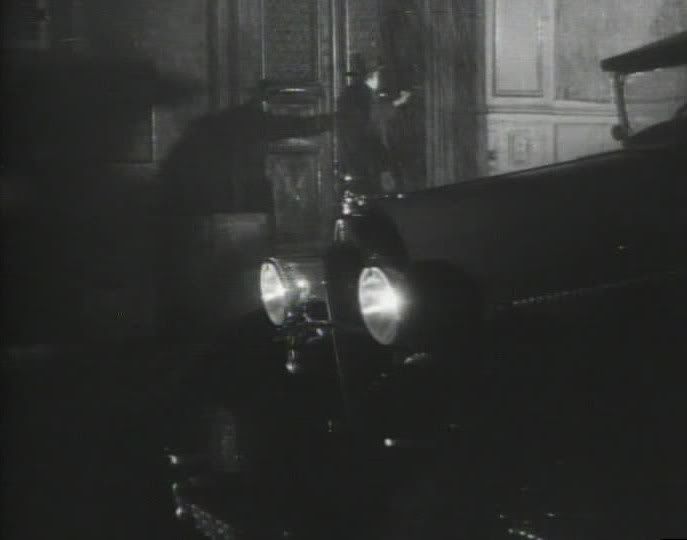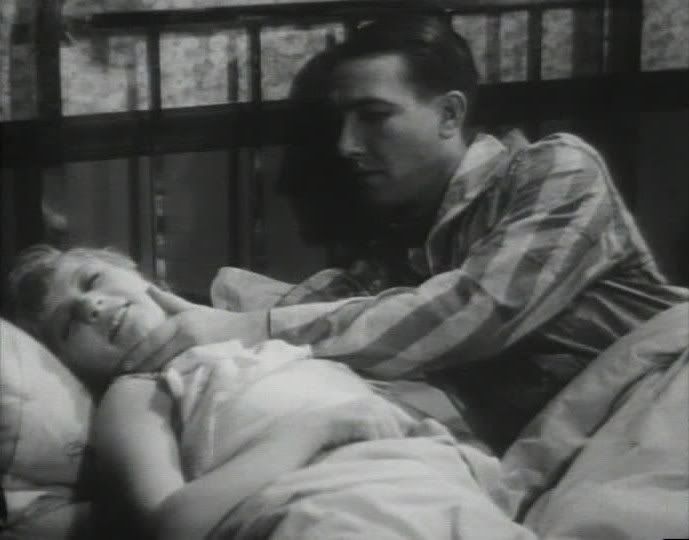
Bleak, tragic, affecting, and at times surprisingly humorous, Jean Renoir's La Chienne is the melancholy tale of a poor schlub who gets in way over his head. Maurice Legrand (Michel Simon) is a low-level cashier, a reserved, quiet guy who's the butt of everyone's jokes because of his social awkwardness and his notoriously nasty wife Adèle (Magdeleine Bérubet). She shrilly browbeats him over the most insignificant things and is constantly comparing him, unfavorably, to her dead first husband, a war hero whose dashing portrait she proudly hangs in the parlor as a reminder of all the ways in which Legrand fails to measure up. Simon delivers a sensitive, heartbreaking performance as this broken and beaten man, his tall frame constantly stooped over, his face droopy and locked into a frown of resignation. He's a forgettable lump of a man, plodding tiredly through life, his only pleasure coming from his painting — a hobby that his wife takes every opportunity to insult him about.
As sad as his life is, though, his attempt to escape this pathetic existence only gets him into even more trouble, when he falls in love with the prostitute Lulu (Janie Marèse). Lulu's a crass opportunist who latches onto Legrand only to get money for her pimp and boyfriend Dédé (Georges Flamant). Legrand, naïve as he is, adores Lulu and doesn't even realize that she's only using him while pining for Dédé, who's as disinterested in her as she is in Legrand. This dysfunctional love triangle plays out with brutal emotional honesty. Even as Legrand's earnest love leads him to ruin, Renoir explores the cruel irony of Lulu being mistreated in turn by Dédé, who never displays a moment of tenderness with her, roughly grabbing her face to kiss her, after which she beams with joy; she's as oblivious as Legrand is.
What's great about the film is the somewhat haphazard unpredictability of its plotting and its juggling of tones. It's a twisty film where the reversals and ironies are anything but cheap, but instead provide bitter commentary on the follies of the characters and the society in which they live. Probably the best example is the subtle humor of the scene where Adèle's "dead" husband Godard (Roger Gaillard) returns, thinking that Legrand would pay him off to stay away, but instead the unhappily married Legrand is all too eager to simply step aside, responding with exaggerated courtliness to the other man's attempted bribery. It's hilarious to watch the dawning fear on Godard's face as he desperately lowers his bribe demand and begins to realize that his plan might backfire on him.

Renoir's style gives the film a deceptively off-the-cuff look, contributing to its low-key realism, but there's great precision in these seemingly casual images. In particular, Renoir often shoots frames within the frame, which call back to the film's opening, a fourth-wall-breaking Punch and Judy introduction which frames this story as an explicitly fictional narrative and promises, somewhat facetiously, that there will be no moral to the story. The prevalence of frames and mirrors surrounding these characters, creating additional layers within the film frame, is a reminder of the dramatic artificiality of this story. In one such shot, Legrand comforts Lulu, sitting on the bed and embracing her, framed by a window, flanked by flowers sticking up from the bed in front of the window. This striking shot recurs in a very different context later in the film, but these frames are everywhere: in the mirrors that reflect Legrand as he shaves, and in the deep focus shots that show Legrand's neighbors doing household chores in the windows across the way.
Even more powerful is the pivotal moment when Legrand discovers Lulu in bed with Dédé. There's a long silence as Renoir cuts to outside, the camera peering through the window at the lovers in bed, then tracking to the right to reveal Legrand standing in the doorway, looking in at them. The distance of the image reflects Legrand's sudden feeling of disconnection, as though he's floating outside of himself, looking in on this scene from a safe distance. Renoir then cuts directly to a closeup of Lulu, lamely trying to justify her actions, which shatters the shocked contemplation of the exterior shot. Renoir also gets a lot of mileage out of the slanted street in front of Lulu's house, and the twisty, shadow-strewn expressionist staircase that leads up to her flat. Her place seems to be built on unstable ground, and all these jagged, crooked lines and serpentine curves emphasize just how far off the straight and narrow path the normally conservative Legrand has wandered whenever he goes to visit her.
The film almost gleefully embraces the moral confusion of its protagonist, whose very normality ultimately allows him to, quite literally, get away with murder. Towards the end of the film, Renoir cleverly shows Legrand slouching discretely away, unnoticed, while the flashy pimp Dédé pulls up in a fancy new car. The film's conclusion suggests that Legrand, a respectable member of bourgeois society and a white collar worker, doesn't have to pay for his actions, at least not in a legal sense, when there's a far less respectable scapegoat at hand. The film ends with a weirdly tragicomic epilogue, in which Legrand and Godard meet up as hobos, years later, both of them gruff old men cackling about their shared fate. When Legrand confesses that he has become a murderer since they last met, Godard simply stares at him for a moment and then shrugs, "it takes all kinds." This cheerful amorality is part of Renoir's vicious satire of the bourgeois, and this ending serves as a prelude of sorts to Boudu Saved From Drowning, in which Renoir again directed Simon as a tramp stomping on middle class respectability; by the end of La Chienne, Simon's Legrand seems primed to become Boudu. La Chienne ends with Legrand telling Godard, without irony, "life is beautiful." As the two men walk away together, Renoir pulls back, through a window that's then revealed as the proscenium of a theater, the curtain falling on this sordid little human drama.

3 comments:
The role Michel Simon plays here is very much in the Emil Jennings mode, and the film was practically re-made by Fritz Lang with his celebrated SCARLET STREET, a noir classic that for me rates below this Renoir film, as exceptional as it is. Renoir creates a convincing portrait of life in Montmartre and Simon gives a towering performance that is on the level of the one he gave in BOUDU SAVED FROM DROWNING, a film that as you note Simon was cast much in the same mold. As you rightly note the tone here isn't oppressively dark (as it is in SCARLET STREET) but it was still reportedly a failure in France, because it was expected Simon and the humorist Georges de la Fouchardiere would focus more on comedic elements.
LA CHIENNE builds to a sense of urgency, and all told it's one of Renoir's greatest and somewhat underrated films.
As always you've given a classic the royal treatment.
Interestignly Jean-Pierre Melville seriously considered remaing La Chienne yet again as he had read the original novel -- which neither Renoir nor Lang followed that closely.
Alas he never got around to it.
Sam, I'd agree that this is a better film than Scarlet Street, though of course Lang's version is also excellent and has its own virtues that set it apart from this version (like Joan Bennett!).
David, that's very interesting indeed, I would've liked to see what Melville would've done with a different perspective on this material.
Post a Comment